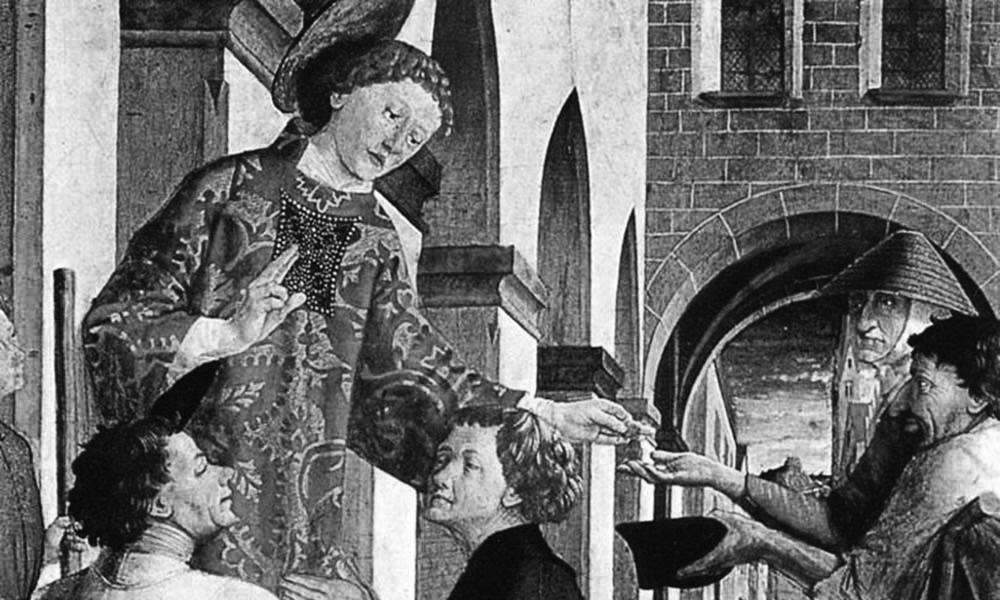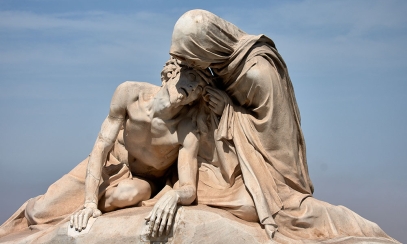
Lectio Divina - Praying Through the Year With Scripture
Are we doing good deeds for the right reasons?
Gospel for March 1, 2017, Ash Wednesday
Jesus said to his disciples: “Take care not to perform righteous deeds in order that people may see them; otherwise, you will have no recompense from your heavenly Father. When you give alms, do not blow a trumpet before you, as the hypocrites do in the synagogues and in the streets to win the praise of others. Amen, I say to you, they have received their reward. But when you give alms, do not let your left hand know what your right is doing, so that your almsgiving may be secret. And your Father who sees in secret will repay you.
“When you pray, do not be like the hypocrites, who love to stand and pray in the synagogues and on street corners so that others may see them. Amen, I say to you, they have received their reward. But when you pray, go to your inner room, close the door, and pray to your Father in secret. And your Father who sees in secret will repay you.
“When you fast, do not look gloomy like the hypocrites. They neglect their appearance, so that they may appear to others to be fasting. Amen, I say to you, they have received their reward. But when you fast, anoint your head and wash your face, so that you may not appear to be fasting, except to your Father who is hidden. And your Father who sees what is hidden will repay you.”(Mt 6:1-6, 16-18)After you have read these verses, pause and ask God to show you what he wants you to see, to understand, to imitate. Then read the passage again, slowly, out loud.
Then read my commentary below, slowly.
In this Gospel passage, Jesus is showing us that doing the good deed (s) is not enough. Our motive is essential. Why do I pray? Why do I do good deeds on behalf of the needs of others? Some people might say, “Well, helping others is an essential part of being a good Christian, a Catholic,” and they would be right.
But, if I am completely honest with myself, do I perform good deeds partly because I want to be recognized? Motive is absolutely essential for our sacrifices during Lent. If I take on various small penances in prayer and fasting, I need to ask myself: “Why am I doing that?” We can be tempted to be somewhat self-focused, self-centered.
Read the passage again; get it first into your mind and your heart. God never asks the impossible. He wants to bring us in love to union with him forever. Self-denial is an essential piece of the process. Jesus is asking us to do penance and, second, to do it for the right reasons. The motives that led the Pharisees to blow trumpets are deadly because they focus on self and exclude God’s essential action, which has the power to transform us if we allow it.
It doesn’t mean you have to hide so that no one sees your good works. The most important thing is to pay attention to your motives and give yourself a “good talking-to” when you realize that a real part of your motivation is to somehow show others how good you are and to receive praise. During Lent, the most important thing we can do is make an honest examination of conscience. Ask yourself point-blank: Why am I choosing to make this sacrifice during Lent? Choose to do it to grow in closeness to God; to contribute your part in making your life more a reflection of his presence than your own; to make the lives of others better. Make only one or two sacrifices during Lent. Every day, ask yourself, “Why am I offering this sacrifice today?” Self-will may try to insert itself and turn your focus to your own satisfaction rather than God’s. If you realize this has happened in the course of the day, take your “double motive” and ask God to purify it. Don’t be discouraged by your selfishness. Lenten sacrifices should help us to see how to turn ourselves more to the Lord and purify our motives.
At Easter, we can more fully enter into his glory and the unfathomable joy of the resurrection because we have decreased in selfishness, and God will have increased his presence in us. Remember the last verse of this Scripture passage: “Your Father, who sees what is hidden, will repay you.”



